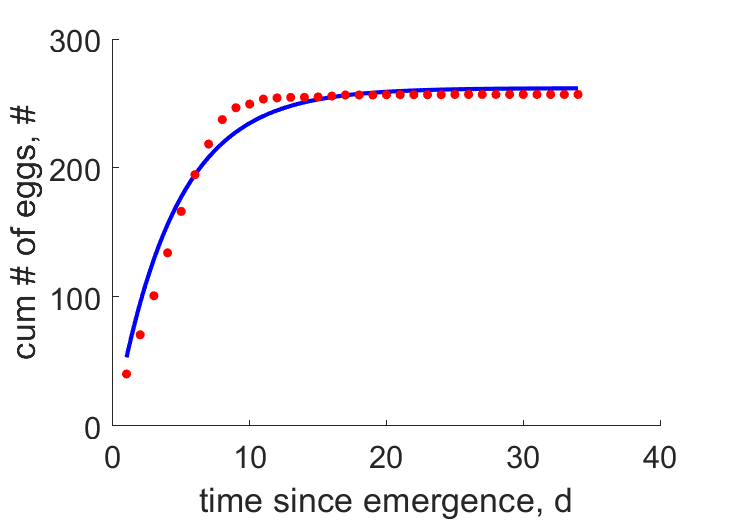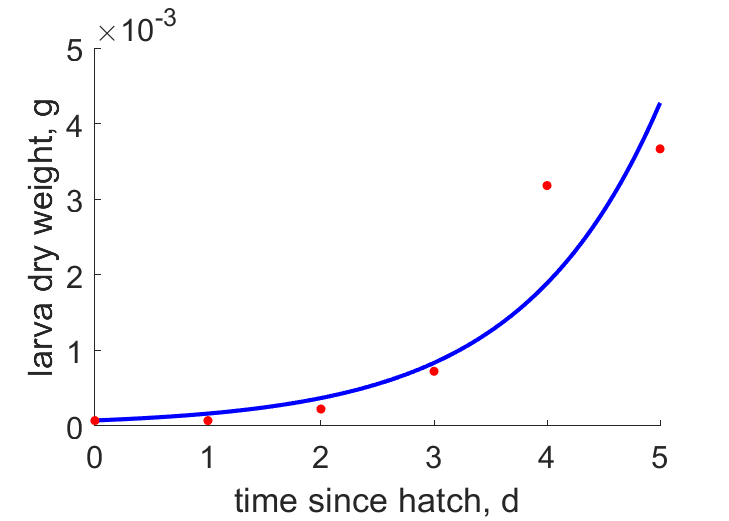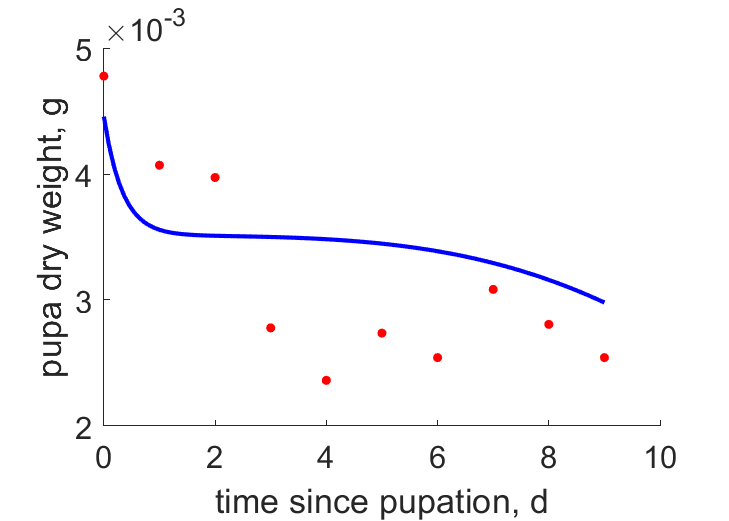Predictions & Data for this entry
| Model: hex | climate: BSk, Csa, Cfb, Dfb | migrate: | phylum: |
| COMPLETE = 2.5 | ecozone: THp | food: bjTii, eiHn | class: |
| MRE = 0.092 | habitat: 0iTf, 0iTi, 0iTg | gender: D | order: |
| SMSE = 0.045 | embryo: Th | reprod: O | family: |
Zero-variate data
| Data | Observed | Predicted | (RE) | Unit | Description | Reference |
|---|---|---|---|---|---|---|
| ab | 4 | 3.165 | (0.2087) | d | age at birth | HarvHarv1994 |
| tj | 5 | 5.125 | (0.025) | d | time since birth at pupation | HarvHarv1994 |
| te | 10 | 3.668 | (0.6332) | d | time since pupation at emergence | HarvHarv1994 |
| am | 36.5 | 37.07 | (0.01568) | d | life span as imago | HarvHarv1994 |
| Wd0 | 1.87e-07 | 1.74e-07 | (0.06956) | g | initial eggs dry weight | HarvHarv1994 |
| Wdb | 6.9e-05 | 7.108e-05 | (0.03017) | g | dry weight at hatch | HarvHarv1994 |
| Wdj | 0.00477 | 0.004456 | (0.06588) | g | dry weight at pupation | HarvHarv1994 |
| Wde | 0.00175 | 0.002191 | (0.2522) | g | dry weight at emergence | HarvHarv1994 |
Uni- and bivariate data
| Data | Figure | Independent variable | Dependent variable | (RE) | Reference |
|---|---|---|---|---|---|
| tN |  | time since emergence | cum # of eggs | (0.03349) | HarvHarv1994 |
| tWd |  | time since hatch | larva dry weight | (0.284) | HarvHarv1994 |
| tWdj |  | time since pupation | pupa dry weight | (0.1799) | HarvHarv1994 |
Pseudo-data at Tref = 20°C
| Data | Generalised animal | Venturia canescens | Unit | Description |
|---|---|---|---|---|
| v | 0.02 | 0.02781 | cm/d | energy conductance |
| p_M | 18 | 5532 | J/d.cm^3 | vol-spec som maint |
| k_J | 0.002 | 0.002 | 1/d | maturity maint rate coefficient |
| k | 0.3 | 0.001663 | - | maintenance ratio |
| kap | 0.8 | 0.9763 | - | allocation fraction to soma |
| kap_G | 0.8 | 0.7731 | - | growth efficiency |
| kap_R | 0.95 | 0.9804 | - | reproduction efficiency |
Discussion
- Hydrophic egg is modelled as a new maturity level E_Hx, which preceeds birth
- E_Hx is treated as birth, while at E_Hb uptake switches from absorbtion to feeding
- All parasitoid data is from host (moth Plodia interpunctella) that was infected at instar 5
- Assimilation by imago is assumed to cover maintenance costs
- mod_2: no allocation to reproduction during imago-stage
Facts
- V. canescens is a koinobiont parasitoid wasp, i.e. allows its host to continue development after parasitism. (Ref: HarvHarv1994)
- It has hydrophic eggs, meaning that they take up nutrients in the embryo-stage. (Ref: HarvHarv1994)
- This species does not host-feed, so host access is just for oviposition. (Ref: HarvHarv1994)
- This entry is discussed in LlanMarq2015 (Ref: LlanMarq2015)
Bibliography